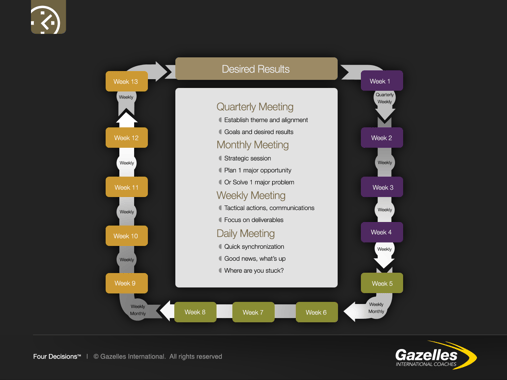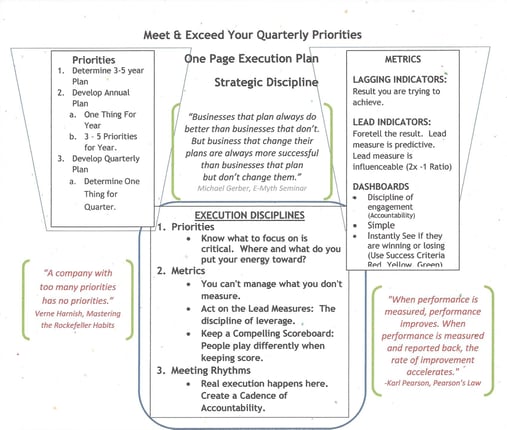 “A culture of discipline is not a principle of business; it is a principle of greatness.”
“A culture of discipline is not a principle of business; it is a principle of greatness.”
-Jim Collins, author of Good to Great
The essence of Strategic Discipline stems from this quote.
Charles Mingus, the late American jazz composer and pianist, once said, “Creativity is more than just being different. Anybody can play weird—that's easy. What's hard is to be as simple as Bach. Making the simple complicated is commonplace-making the complicated simple, awesomely simple--that’s creativity.”
Habits
Winning in any field requires developing habits. We are who we are due to our habits. If you don’t believe me, see Collins above and these other experts who are much smarter than I:
"We first make our habits, and then our habits make us.” ~ John Dryden
“We are what we repeatedly do. Excellence, then, is not an act, but a habit.” ~ Aristotle
Finally this from Charles Duhigg, author of The Power of Habit: Why We Do What We Do in Life and Business, quoted in an HBR article, Habits: Why We Do What We Do: “… habits are a big deal not only in our lives, because about 40% to 45% of what we do every day sort of feels like a decision, but it’s actually habit. But equally importantly, habits are a really big deal within companies. And we know this because in the last 10 or 15 years there’s been this real wealth of an explosion in research in looking at organizational routines or organizational habits and trying to understand how those influence how work gets done. And what we’ve learned is that a huge amount of whether a company succeeds or fails is based not on sort of the big strategy decisions that people make, but on the habits that emerge within the organization.”
Building a Winning Habit requires Strategic Discipline. Let’s attempt to simplify what Strategic Discipline is:
Priority
Watch this video (THE ONE THING BY GARY KELLER | ANIMATED BOOK REVIEW) to get a better idea of the battle you and your organization’s have with mediocrity.If achieving/winning is all about habits, then your organization must be aligned on what you desire to achieve. Most organizations aren’t.
Your organizations must be absolutely clear about what your Priority is. Therefore, Clarity’s First Step – Determining Your One Thing.
This leads to the focusing question: "What's the ONE Thing I can do such that by doing it everything else will be easier or unnecessary?”
Watch this Domino Chain Reaction video to appreciate the Power of One Thing!
MetricsSetting a priorit, Your One Thing, requires another step – Measurement! How will you know you’ve achieved your One Thing? What will Your One Thing look like when you’ve completed it? Without measuring it, you really will never be able to realize whether you’ve achieved it or not.
 Any goal or objective you set for your Annual, or quarterly planning requires metrics. We’ve offered Pearson’s Law repeatedly to amplify the power of measurement. “When performance is measured, performance improves. When performance is measured reported back, performance improves exponentially!”
Any goal or objective you set for your Annual, or quarterly planning requires metrics. We’ve offered Pearson’s Law repeatedly to amplify the power of measurement. “When performance is measured, performance improves. When performance is measured reported back, performance improves exponentially!”
Every organization wants to have their performance improve exponentially. Every organization I’ve worked with, when it begins measuring performance in any area, business performance improves. The inhibitor on attaining exponential improvement is people, systems and choosing the right metric.
Creating a Priority – One Thing – for the Quarter and Year, placing a metric to determine success, is a winning habit. Failing to achieve your One Thing is never truly failing. Reload with the right people, system, or choose a better metric to measure your progress. When you do, success is guaranteed.
Meeting Rhythms
In Strategic Discipline we call this a Cadence of Accountability. Annual and Quarterly Meetings set the objectives, most critical, Your One Thing. Metrics are set for determining achievement. These are created as success criteria, colors vividly portraying levels of accomplishment. The colors help determine the amount of time to focus on each objective in weekly, and monthly meetings, and the person responsible for its attainment. Annual meetings cascade to quarterly, quarterly to monthly, then weekly and finally daily huddles, aligning your team from the front lines to the executive team. Every meeting has a specific agenda designed to achieve identified benchmarks to propel the business forward and ensure accountability. Each day, daily huddles bring a focus on the One Thing with each individual sharing their performance, and their metric designed to help the company achieve its overarching One Thing.
Annual meetings cascade to quarterly, quarterly to monthly, then weekly and finally daily huddles, aligning your team from the front lines to the executive team. Every meeting has a specific agenda designed to achieve identified benchmarks to propel the business forward and ensure accountability. Each day, daily huddles bring a focus on the One Thing with each individual sharing their performance, and their metric designed to help the company achieve its overarching One Thing.
The graphic here shares a visual of the three elements, and the encapsulating principle of Scaling Up’s 4-3-2-1 formula for success.
 Want to Build your organization into a consistent winner? This is what Positioning Systems does best, build a Winning Habit. Contact dwick@positioningsystems.com for a 30 minute discovery session, or take our Free Needs Assessment to discover how your organization is performing on the Four Decisions for Growth.
Want to Build your organization into a consistent winner? This is what Positioning Systems does best, build a Winning Habit. Contact dwick@positioningsystems.com for a 30 minute discovery session, or take our Free Needs Assessment to discover how your organization is performing on the Four Decisions for Growth.
Expectations Next Blog
 In the Psychology of Achievement, an audio series from Brian Tracy I’ve listened to repeatedly and even transcribed, Tracy shares surprising results from a study of students in the San Francisco Bay area whose teachers expected them to do extremely well. Job Scorecards, listing employee expectations are extraordinarily valuable in getting your team to perform at a high level. How valuable? That story, next blog, may surprise you on just how impactful your beliefs and expectations drive your team performance.
In the Psychology of Achievement, an audio series from Brian Tracy I’ve listened to repeatedly and even transcribed, Tracy shares surprising results from a study of students in the San Francisco Bay area whose teachers expected them to do extremely well. Job Scorecards, listing employee expectations are extraordinarily valuable in getting your team to perform at a high level. How valuable? That story, next blog, may surprise you on just how impactful your beliefs and expectations drive your team performance.






.jpeg?width=150&height=135&name=Hand%20with%20marker%20writing%20the%20question%20Whats%20Next_%20(1).jpeg)

